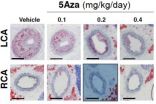(Press-News.org) In a PLOS Medicine guest editorial, Paul Glasziou, Professor of Evidence-Based Medicine at Bond University in Australia, explores how open access publications could help moderate and reduce the vast waste of global medical research.
Continuing on from his previous work, which highlighted how most of the world's expenditure on medical research was thrown away, Glasziou outlines how bad the situation is and suggests how it might be improved. Subscription-based academic journals make money by through copyrights assigned by authors to publishers who lock the articles behind paywalls. Open access models, in which journals charge a publication fee and then make research and related content fully and immediately available to all, stand to aid the dissemination of knowledge and to improve its quality.
"The waste sounds bad but the reality is worse," writes Glasziou. "The estimate that '85% of research' is wasted referred only to activities prior to the point of publication." After that, he points out, other barriers create post-publication waste. Despite all the effort and attention put into funding medical research through charitable and government programmes, publishing models that restrict access to research outcomes mean that profit comes at the expense of human health. The systems that encourage poor research and poor communication of research findings may seem like dry subjects but the waste they cause costs lives. Charities and governments should ensure the work they fund and authorise is published in an open access manner, thereby making it far more effective.
"To get full value from research investment," Glasziou concludes, "we need to reduce both the annual $100 billion of pre-publication (research production) waste and the unquantified cost of post-publication (research dissemination) barriers … If over a hundred billion dollars of medical research money were being wasted by corruption, the public and political outcry would be overwhelming. That resources of this magnitude are being wasted through incompetence and inattention should be seen as a similar scandal. Badly designed and poorly thought through systems of research and dissemination subtract massively from global human health."
INFORMATION:
Editorial
Funding: PG is supported by NHMRC grant 0527500. The funders had no role in study design, data collection and analysis, decision to publish, or preparation of the manuscript.
Competing Interests: The author declares that no competing interests exist.
Citation: Glasziou P (2014) The Role of Open Access in Reducing Waste in Medical Research. PLoS Med 11(5): e1001651. doi:10.1371/journal.pmed.1001651
Author Affiliations: Bond University, Australia
IN YOUR COVERAGE PLEASE USE THIS URL TO PROVIDE ACCESS TO THE FREELY AVAILABLE PAPER:
http://www.plosmedicine.org/article/info%3Adoi%2F10.1371%2Fjournal.pmed.1001651
Contact:
Paul Glasziou
Bond University
AUSTRALIA
pglaszio@bond.edu.au; paul_glasziou@bond.edu.au
Making research findings freely available is an essential aid to medical progress
2014-05-28
ELSE PRESS RELEASES FROM THIS DATE:
Dealing with stress -- to cope or to quit?
2014-05-28
Cold Spring Harbor, NY – We all deal with stress differently. For many of us, stress is a great motivator, spurring a renewed sense of vigor to solve life's problems. But for others, stress triggers depression. We become overwhelmed, paralyzed by hopelessness and defeat. Up to 20% of us will struggle with depression at some point in life, and researchers are actively working to understand how and why this debilitating mental disease develops.
Today, a team of researchers at Cold Spring Harbor Laboratory (CSHL) led by Associate Professor Bo Li reveals a major insight ...
Intertwined evolution of human brain and brawn
2014-05-28
The cognitive differences between humans and our closest living cousins, the chimpanzees, are staggeringly obvious. Although we share strong superficial physical similarities, we have been able to use our incredible mental abilities to construct civilisations and manipulate our environment to our will, allowing us to take over our planet and walk on the moon while the chimps grub around in a few remaining African forests.
But a new study suggests that human muscle may be just as unique. Scientists from Shanghai's CAS-MPG Partner Institute for Computational Biology, together ...
Disturbance in blood flow leads to epigenetic changes and atherosclerosis
2014-05-28
Disturbed patterns of blood flow induce lasting epigenetic changes to genes in the cells that line blood vessels, and those changes contribute to atherosclerosis, researchers have found. The findings suggest why the protective effects of good blood flow patterns, which aerobic exercise promotes, can persist over time. An epigenetic change to DNA is a chemical modification that alters whether nearby genes are likely to be turned on or off, but not the letter-by-letter sequence itself.
The results are scheduled for publication in the Journal of Clinical Investigation.
Atherosclerosis ...
Keeping active pays off even in your 70s and 80s
2014-05-28
Older people who undertake at least 25 minutes of moderate or vigorous exercise everyday need fewer prescriptions and are less likely to be admitted to hospital in an emergency, new research has revealed.
The findings, published in the journal PLOS ONE, reinforce the need for exercise programmes to help older people stay active. It could also reduce reliance on NHS services and potentially lead to cost savings.
In the first study of its kind looking at this age group, researchers from the University of Bristol looked at data from 213 people whose average age was 78.
Those ...
Endoscopic procedure does not reduce disability due to pain following gallbladder removal
2014-05-27
In certain patients with abdominal pain after gallbladder removal (cholecystectomy), undergoing an endoscopic procedure involving the bile and pancreatic ducts did not result in fewer days with disability due to pain, compared to a placebo treatment, according to a study in the May 28 issue of JAMA.
Post-cholecystectomy pain is a common clinical problem. More than 700,000 patients undergo cholecystectomy each year in the United States, and at least 10 percent are reported to have pain afterwards. Most of these patients have no significant abnormalities on imaging or ...
Study examines variation in cardiology practice guidelines over time
2014-05-27
An analysis of more than 600 class I (procedure/treatment should be performed/administered) American College of Cardiology/American Heart Association guideline recommendations published or revised since 1998 finds that about 80 percent were retained at the time of the next guideline revision, and that recommendations not supported by multiple randomized studies were more likely to be downgraded, reversed, or omitted, according to a study in the May 28 issue of JAMA.
As adherence to recommended clinical practice guidelines increasingly is used to measure performance, ...
Penn study: Longest-lasting cardiology guidelines built on findings of randomized controlled trials
2014-05-27
PHILADELPHIA –Clinical practice guideline recommendations related to screening and treatment can change markedly over time as new evidence about best practices and clinical outcomes of various treatments emerges. In a first-of-its-kind study, Penn Medicine researchers examined high-level recommendations published by the American College of Cardiology (ACC) and the American Heart Association (AHA) between 1998 and 2007 and found that recommendations which were supported by multiple randomized controlled trials were the most "durable" and least likely to change over time. ...
Citizens help researchers to challenge scientific theory
2014-05-27
Science crowdsourcing was used to disprove a widely held theory that "supertasters" owe their special sensitivity to bitter tastes to an usually high density of taste buds on their tongue, according to a study published in the open-access journal Frontiers in Integrative Neuroscience.
Supertasters are people who can detect and are extremely sensitive to phenylthiocarbamide and propylthiouracil, two compounds related to the bitter molecules in certain foods such as broccoli and kale. Supertasting has been used to explain why some people don't like spicy foods or "hoppy" ...
Study identifies risk of chemotherapy related hospitalization for eary-stage breast cancer patients
2014-05-27
Oncologists now have a new understanding of the toxicity levels of specific chemotherapy regimens used for women with early stage breast cancer, according to research from The University of Texas MD Anderson Cancer Center.
The retrospective study, published in the Journal of Clinical Oncology, used large population-based data to compare the risk of hospitalization for six common chemotherapy regimens. Reasons for hospitalization included infection, fever, anemia, dehydration, neutropenia (low white blood cell count), thrombocytopenia (low blood platelets) and delirium. ...
Quantity, not quality: Risk of sudden cardiac death tied to protein overproduction
2014-05-27
A genetic variant linked to sudden cardiac death leads to protein overproduction in heart cells, Johns Hopkins scientists report. Unlike many known disease-linked variants, this one lies not in a gene but in so-called noncoding DNA, a growing focus of disease research. The discovery, reported in the June 5 issue of The American Journal of Human Genetics, also adds to scientific understanding of the causes of sudden cardiac death and of possible ways to prevent it, the researchers say.
"Traditionally, geneticists have studied gene variants that cause disease by producing ...




